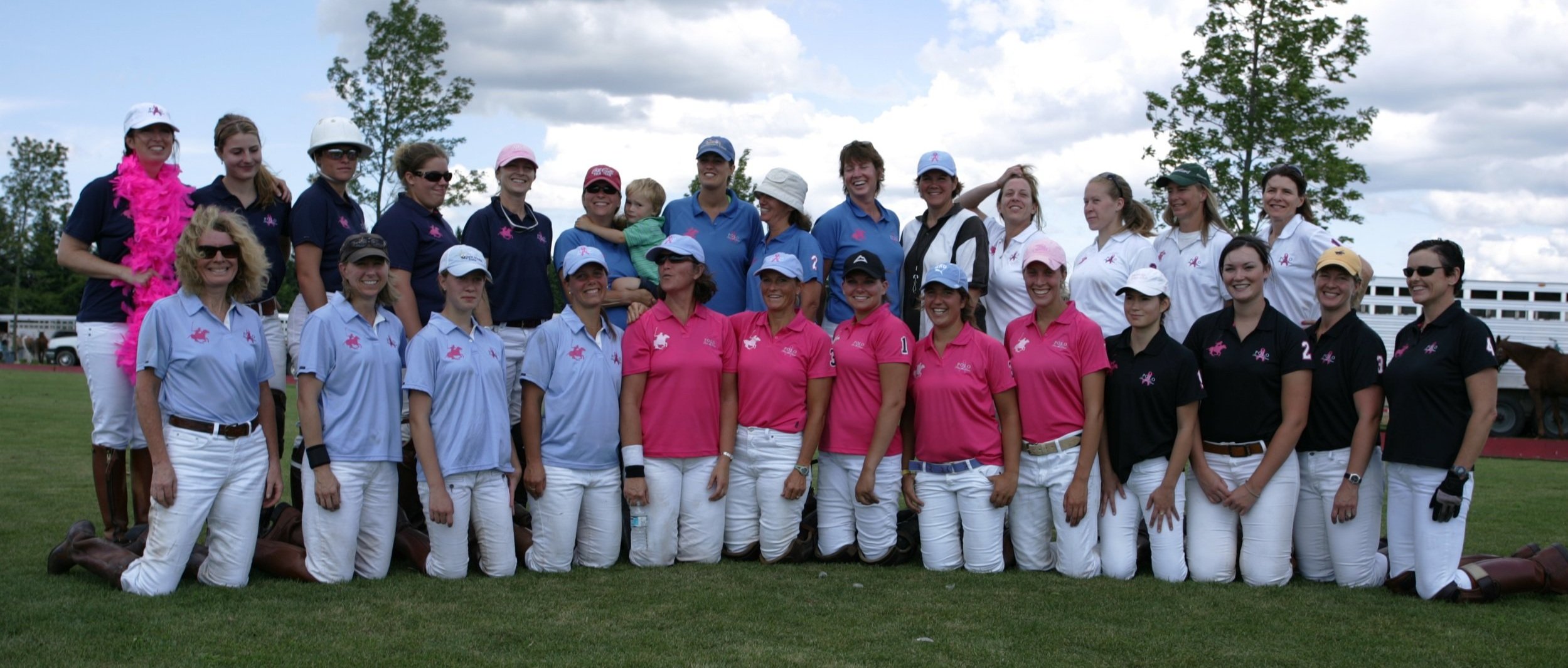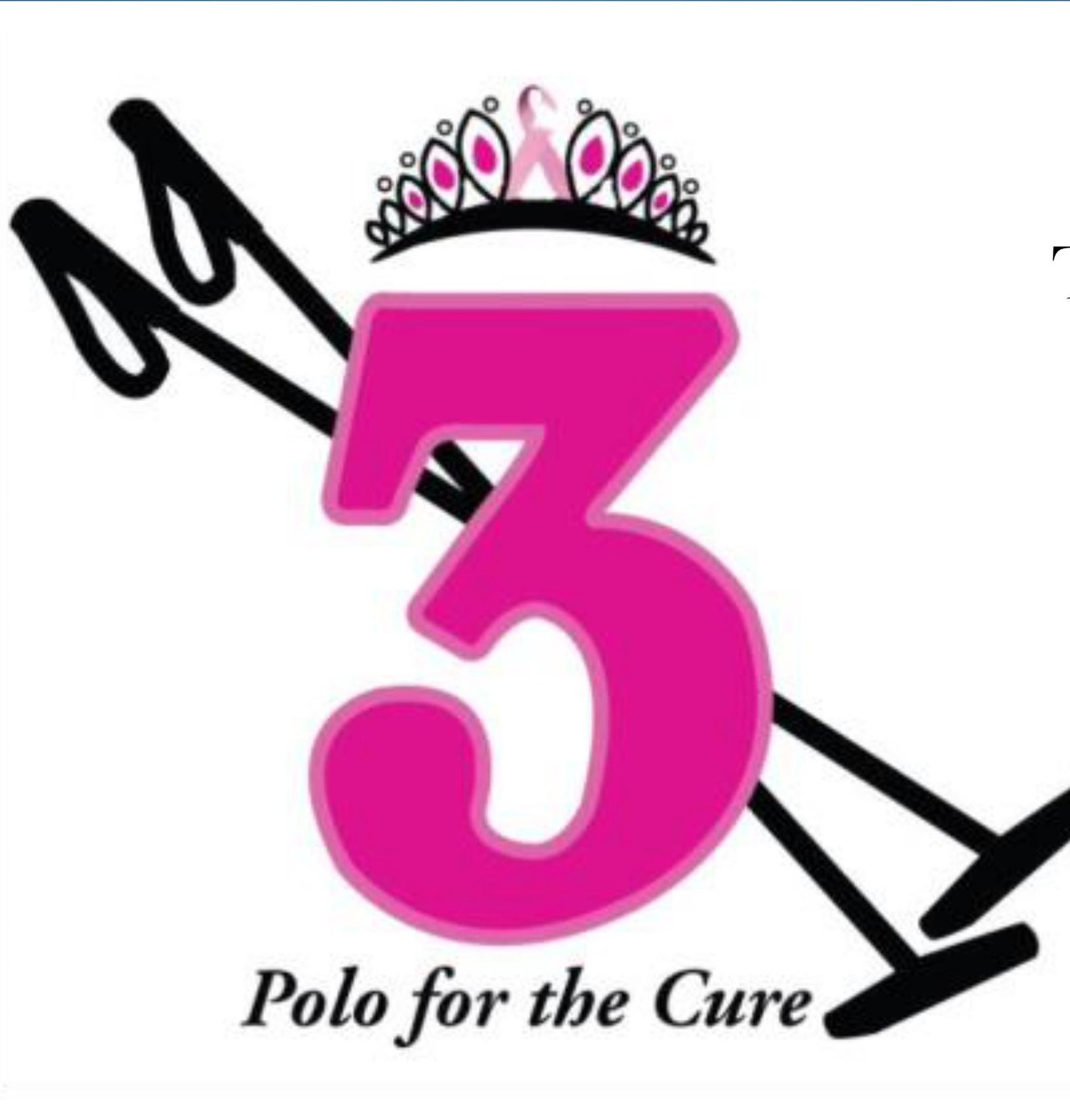
Polo For The Cure
How it began…
15 years ago Toronto Polo Club members Keri Weir and Donna Malloy began a women’s polo tournament at the club. After an aunt and a close friend were diagnosed with breast cancer, the ladies decided to turn the tournament into a fundraiser for breast cancer treatment and research at their local hospital, the Southlake Regional Health Centre. Fast forward to 2023, and Polo For The Cure is Canada’s largest and longest running women’s polo event. Every year there are 10 to 12 teams of women players that come from clubs across the country and the USA to attend this popular event. Keri and Donna continue to spearhead the tournament, along with a team of volunteers.
Competitive women’s polo, shopping, silent auction, and the popular Champagne divot stomp at half-time, all make for an unforgettable day at the Toronto Polo Club. We hope you can join us on Saturday July 29, 2023.
Canadian Women in Polo
Though women have been playing polo since the sport was first introduced into North America, female players were few and far between. There were a small number of women who played in the 1920’s (in fact the Calgary Polo Club fielded a women’s team that played in New York at the first international women’s tournament) however polo was traditionally a male dominated sport. Women were not even permitted to join the United States polo Association until the mid-1970’s. This, however, has been changing over the last 5 decades as women polo players represent one of the largest growing sectors of polo today. Women polo players now account for approximately 40% of registered players with the Canadian Polo Association and the United States Polo Association.
Pioneer women players in the 1970's at the Toronto Polo Club, such as Kelly Offen and Sue Smellie, paved the way for females to play at the club. Similarly, in Western Canada, Julie and Jan Roenisch were also the catalyst that brought serious women’s polo back to the Calgary Polo Club for the first time in fifty years. Coming from avid polo families, these ladies showed the men that females can be worthy contenders on the polo field.
Loretta Thompson was instrumental in pioneering women's participation at the Grande Prairie Polo club. A mutual love of horses and polo brought her and her husband Cledwyn Lewis together. Not only did they encourage women players, but they also made it a priority to foster relationships with other polo clubs across Canada and around the World.
Thanks to the perseverance and determination of so many of these early women players, most Canadian polo clubs today have a large roster of female players. The Greater Niagara Polo Club membership is comprised of over 70% women and girls. They have successful women’s Interscholastic and Intercollegiate teams that compete on the USPA circuit. The Club runs a weekly ‘Ladies Night’ - a fun and supportive polo match of 12 - 16 women players, followed by a boisterous potluck with food, drink and a lot of laughter in the clubhouse. Similarly, the Toronto Polo Club has also had many successful women’s interscholastic and intercollegiate teams over the years, and also boasts a large number of female players in its membership roster.
As the number of women players grow, so do the number of women's only polo tournaments. There have been several highly competitive women's tournaments held at the Calgary Polo Club over the last few decades, attracting top women players from around the World. In 1991 The Ottawa Polo Club held the first Eastern Canadian Women’s tournament, bringing women players from Ontario and Quebec. Today, the Ottawa Polo Club membership is comprised of 50% women players.
"Polo For The Cure" is held every summer at the Toronto Polo Club. The tournament is now in its 15th year and is also a fundraiser for breast cancer research and treatment at Southlake Regional Health Centre. To date over $1million dollars has been raised for this cause. The tournament brings between 10-12 teams of women every year, with two flights of games. Polo For The Cure was developed by two members of the Toronto Polo Club, Keri Weir and Donna Malloy, and continues to live on as the longest running annual women's tournament in Canada.
Women’s tournaments have also been a common event at the Springfield Polo Club over the years, though not always annual. A few years of tournaments were played around the change of the millennium for local women of the club, but then in 2006 Sue Smith, along with Colleen Kelly-Hrynchuk and Bobbi Enns, organized a women's tournament with incoming players. Reciprocal polo trips with many clubs across Western Canada for mixed polo had created a "polo family" of friends and it was the women among these friends who got together in mid-August at the Springfield Polo Club. In 2007, the tournament grew from three to four teams. Club theme parties continued, and the tournament enjoyed five good years. A number of years went by until 2019 when a women's match was revived due to the influx of new women playing polo at the Springfield Polo Club.
With the growth of women's polo in Canada there are many strong female players that have come though the ranks and stood out for their exceptional talent. Julie Roenisch, from the Calgary Polo Club, got to a 2-goal handicap, and in 1992 became the first woman to ever play in the US open. Manitoba born Dayelle Fargey is currently the only female professional player in Canada, and also made it to 2-goals (6 goals women’s handicap). Dayelle, along with other local women players, helped to start the first ‘women-only’ games at the Royal Winnipeg Polo Club, which evolved into women’s tournaments at clubs across Western Canada. Dayelle plays professionally in the US during the winters, and at the Calgary Polo Club in the summers. There are so many strong women players scattered across the country that have represented Canada on the International playing field over the last few decades, that it is difficult to highlight just a few. However, in the short but glorious history of modern-day women’s polo it is fair to say that women’s polo is alive and well in Canada.

